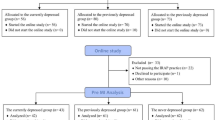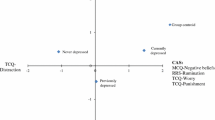Abstract
The Cognitive Bias Questionnaire, the Present State Examination, the Beck Depression Inventory, and an expectancy of success measure were administered to depressed and nondepressed psychiatric inpatients. The depressed subjects selected significantly more depressed distortions on the Cognitive Bias Questionnaire than did the nondepressed subjects. Results also revealed that depressed distortion scores from the Cognitive Bias Questionnaire correlated significantly with measures of cognitive distortion obtained from the Beck Depression Inventory, the Present State Examination, and an experimental task. Although primary and secondary depressed groups did not differ significantly in their responses to the Cognitive Bias Questionnaire, depressed subjects who endorsed high levels of depressed distortion revealed significantly more cognitive symptoms of depression on the Beck Depression Inventory and the Present State Examination, and evidenced a nonsignificant trend to expect less success prior to an experimental task. Implications of these results for future research in this area are discussed.
Similar content being viewed by others
References
Akiskal, H. S. A biobehavioral approach to depression. In R. A. DePue (Ed.),The psychobiology of depressive disorders: Implications for the effects of stress. New York: Academic Press, 1979.
American Psychiatric Association.Diagnostic and statistical manual of mental health disorders (3rd ed.). Washington, D.C.: Author, 1980.
Andreasen, N. C., & Winokur, G. Secondary depression: Familial, clinical, and research perspectives.American Journal of Psychiatry 1979,136 62–66.
Beck, A. T.Depression: Clinical, experimental and theoretical aspects. New York: Hoeber, 1967.
Beck, A. T.Cognitive therapy and the emotional disorders. New York: International Universities Press, 1976.
Cohen, J. A coefficient of agreement for nominal scales.Educational and Psychological Measurement 1960,20 37–46.
Craighead, W. C. Away from a unitary model of depression.Behavior Therapy 1980,11 122–128.
Hammen, C. L., and Krantz, S. Effect of success and failure on depressive cognitions.Journal of Abnormal Psychology 1976,85 577–586.
Krantz, S., & Hammen, C. L. Assessment of cognitive bias in depression.Journal of Abnormal Psychology 1979,88 611–619.
Loeb, A., Beck, A. T., & Diggory, J. Differential effects of success and failure on depressed and nondepressed patients.Journal of Nervous and Mental Disease 1971,152 106–114.
Miller, I. W., & Norman, W. H. The effects of attributions for success on the alleviation of learned helplessness and depression.Journal of Abnormal Psychology 1981,90 113–124.
Spitzer, R. L., Endicott, J., & Robins, E. Research diagnostic criteria.Archives of General Psychiatry 1978,35 773–782.
Weckowicz, T. E., Muir, W., & Cropley, A. J. A factor analysis of the Beck inventory of depression.Journal of Consulting Psychology 1967,31 23–28.
Weed, L. L.Medical records, medical education, and patient care. Cleveland: The Press of Case Western Reserve University, 1970.
Wing, J. K., Cooper, J. E., & Sartorius, N.Measurement and classification of psychiatric symptoms. Cambridge, England: Cambridge University Press, 1974.
Woodruff, R. A., Goodwin, D. W., & Guze, S. B.Psychiatric diagnosis. New York: Oxford University Press, 1974.
Author information
Authors and Affiliations
Rights and permissions
About this article
Cite this article
Norman, W.H., Miller, I.W. & Klee, S.H. Assessment of cognitive distortion in a clinically depressed population. Cogn Ther Res 7, 133–140 (1983). https://doi.org/10.1007/BF01190066
Issue Date:
DOI: https://doi.org/10.1007/BF01190066




